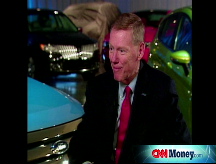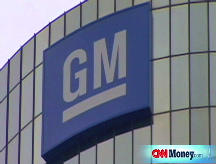Bush announces auto rescue
Government to loan GM and Chrysler $13.4 billion from Wall Street bailout fund so that the embattled auto firms don't run out of cash.
NEW YORK (CNNMoney.com) -- President Bush announced a rescue plan for General Motors and Chrysler LLC Friday morning that will make $13.4 billion in federal loans available almost immediately.
The money will come from the $700 billion fund set aside to bail out Wall Street firms and banks in October.
With these loans, Treasury will have committed virtually all of the $350 billion of that fund that it can hand out without additional authorization from Congress. Once Congress releases the other $350 billion, the two automakers will be able to borrow an additional $4 billion.
GM (GM, Fortune 500) will get $9.4 billion from the first allocation of federal loan money, while Chrysler would get the other $4 billion.
The loans are for three years, but the money will have to be repaid in full within 30 days if the firms do not show themselves to be viable by March 31.
During brief remarks at the White House, President Bush said in normal times he would have not been in favor of preventing a bankruptcy of the two companies. But the current state of the economy and credit markets left him no choice but to act.
"Government has a responsibility to safeguard the broader health and stability of our economy," he said. "If we were to allow the free market to take its course now, it would almost certainly lead to disorderly bankruptcy and liquidation for the automakers."
"In the midst of a financial crisis and a recession, allowing the U.S. auto industry to collapse is not a responsible course of action," Bush added.
In a statement, President-elect Barack Obama said today's loan was "a necessary step to help avoid a collapse in our auto industry that would have devastating consequences for our economy and our workers."
Obama added that "the auto companies must not squander this chance to reform bad management practices and begin the long-term restructuring that is absolutely required to save this critical industry and the millions of American jobs that depend on it."
The terms of the loan are similar to those set in the auto bailout legislation that was passed by the House last week but was shot down in the Senate.
Executives at GM and Chrysler must agree to limits on their compensation and eliminate perks such as corporate jets. The companies also must issue warrants, which convert into non-voting stock, to the government.
GM Chairman and CEO Rick Wagoner, who had previously agreed to reduce his salary to $1 a year in return for the federal loans, said at a press conference Friday he has no intention to resign. Some critics of GM have called for him to do so.
"You think I would have gone through what I did the last two months if I didn't want to stay?" he said.
The loans do not include the concept of a so-called "car czar" to oversee the automakers, although it does say that a designee of the President would determine if the automakers are making the changes necessary for them to be considered viable.
The Bush administration official said Treasury Secretary Henry Paulson would fill that role in the remaining days of the current administration.
The loans call for the automakers to prove they are viable by March 31, even though they are not expected to be profitable by that date. They must submit the details of the plans by Feb. 17.
The government wants the automakers to reduce their debt load by two-thirds via a debt for equity exchange with current bondholders and get the United Auto Workers union to agree to wages and work rules competitive with non-union plants operated by Asian auto manufacturers by the end of next year.
Wagoner said negotiations with GM debt holders and the union will begin almost immediately now that the loans are in place. He added that the company is confident it will be able to meet the targets set out as terms of the loan.
In addition, the government is calling for GM and Chrysler to use their stock to pay for half the funds needed to cover future retiree health care expenses, which will be paid by union-controlled trust funds, rather than the automakers themselves, starting in 2010.
But there is flexibility for the companies and the incoming Obama administration to allow the loans to continue even if these targets are not reached, as long as GM and Chrysler can provide an explanation as to why they are viable without hitting those targets.
Republican senators demanded hard targets for labor union concessions and cited the UAW's resistance to agree to them as the reason the bill died last week.
A Bush administration official cautioned that the government should not play a big role in the union negotiations that will take place in the next three months.
"We do not feel it is appropriate for government to dictate the specific terms of negotiations between management and labor or management and dealers or management and creditors," the official said.
UAW President Ron Gettelfinger said the union does not want further concessions to be spelled out in the loan agreement, but that the union would hold talks with the government about how to make the Big Three more competitive.
"We will work with the Obama administration and the new Congress to ensure that these unfair conditions are removed as we join in the coming months with all stakeholders to create a viable future for the U.S. auto industry," he said.
GM (GM, Fortune 500) has warned it will fall below the minimum amount of cash it needs to continue to operate without $4 billion in federal loans before the end of the month. Privately held Chrysler said it will need $4 billion or it will also run out of cash early next year.
Ford Motor (F, Fortune 500) has more cash on hand and has said it should be able to avoid tapping into federal dollars unless the weak auto sales continue longer than it expects in 2009.
Shares of GM soared more than 10% Friday morning on the news of the loan and Ford was up 5%.
U.S. auto sales plunged to 26-year lows last month as tight credit, rising job losses and weak consumer confidence have led to a virtual collapse in the auto market.
All of the major automakers, including Asian automakers Toyota Motor (TM) and Honda Motor (HMC), are cutting back production. But the situation is particularly severe at GM and Chrysler.
In the last week, those two automakers announced shutdowns of assembly lines for at least a month, several weeks longer than the typical shutdowns during the December holiday season. ![]()




